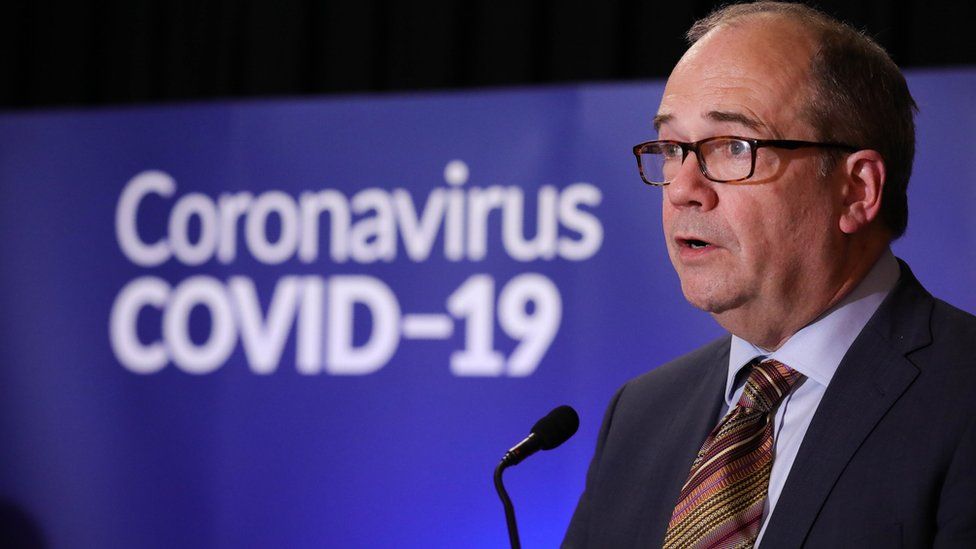Covid inquiry: Lack of ministers had 'significant impact' on planning
- Published

The chief medical officer played a prominent role in NI's Covid response
The absence of Stormont ministers had a "significant impact" on Northern Ireland's preparedness for the Covid-19 pandemic, the chief medical officer has said.
Sir Michael McBride was giving evidence to the UK Covid-19 inquiry in London.
Former first and deputy first ministers, Baroness Foster and Michelle O'Neill, are scheduled to give evidence later this week.
Then-health minister Robin Swann gave evidence last week.
Sir Michael told the inquiry there was "no doubt" the lack of ministers in the years before the pandemic had "a significant impact on our ability to initiate new policy".
Robin Swann gave evidence last week
The first phase of the inquiry is examining how prepared the UK was for the pandemic, including within the devolved administrations.
The chief medical officer told the inquiry that resources were diverted to EU-exit planning - work was picked up again in January 2020 - but he added that "events overtook us".
He added that there was "absolutely no doubt" the absence of ministers between 2017 and 2020 affected preparations.
He also said that the pre-existing position of the department before the pandemic showed there was a "shortfall in resources and insufficient staff to mount the response that was required".
Speaking about why Northern Ireland and the Republic of Ireland did not have a single epidemiological policy to deal with a pandemic, Sir Michael McBride said they did take a "single approach to border county areas".
He added that this was at operational level, not at a policy level.
The former permanent secretary at the Department of Health (DoH), Richard Pengelly, is also set to give evidence this week.
The DoH is responsible for leading and co-ordinating the health response when an emergency has been categorised as serious or catastrophic and requires a cross departmental or cross governmental response.
The inquiry is likely to explore to what extent this plan was kept under review and also how well it was tested.
Last week, former health minister Robin Swann told the inquiry that a lack of reform and investment in the health service hindered its response to the pandemic.
The inquiry is into the government's handling of the coronavirus pandemic
Brenda Doherty, a leading figure in the Covid-19 Bereaved Families for Justice group, said it was an important week for Northern Ireland at the inquiry.
"Amongst the witnesses to be called, the person I most hope will be able to answer questions fully is the chief medical officer," she said.
"During his evidence, the former Health Minister Mr [Robin] Swann on several occasions advised the inquiry legal team to direct some of the questions he was unable to answer to Dr McBride."
Ms Doherty said it was "vital that we have total openness and transparency".
- Published6 days ago
- Published6 July 2023
- Published14 June 2023